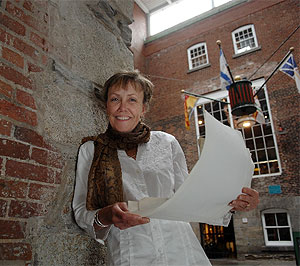 |
| Medieval scholar Cynthia Neville has been named the George Munro Professor of History. (Danny Abriel Photo) |
A month after the execution of Mary, Queen of Scots, there was a meeting between representatives from England and Scotland. According to accounts of that meeting in March 1587, the English assured the Scots that Queen Elizabeth was “verie sorie for taking Queine Mareis lyfe,” and offered to make it up to the new king.
The Scots’ response must have sounded strange to the English, but not to scholar Cynthia Neville had she been there. It was not only James VI who required compensation, the Scots told the bewildered English ambassadors, but rather all the kin and friends of the victim, according to the “custome of Scotland.”
Scottish society, which formed in relative isolation from the rest of Europe, has always been highly concerned with matters of kinship, status, honour and the regulation of blood feuds. Ideas about land ownership, legal systems and structures of authority were also quite distinct.
“Scotland is unique and the sovereign powers are different (compared to elsewhere in Europe),” says Dr. Neville, professor of history at Dalhousie University. “In Scotland, the power of the crown is balanced with the power of kindred, and it makes the study of medieval Scotland quite fascinating.”
Pardon me?
Recently named the George Munro Professor of History at Dalhousie, Dr. Neville’s research focus is on the social and cultural encounter between the Gaels and Europeans in medieval Scotland. She will soon complete a large research project looking into 13th century royal charters, and another book, Land, Law and People in Medieval Scotland (Edinburgh University Press), is due out later this year. She is now turning her attention to the study of pardons issued by the kings of Scotland.
Unlike in England, where offences were seen to be committed against the king, in Scotland, those who committed offences were expected to make recompense to the king for breaking the peace and to the victim’s family—the kindred—who were also seen to have been injured. If offences went unsettled, “then the family would have the legal right to seek vengeance on the people who harmed them,” explains Dr. Neville.
“The king can pardon until the cows come home,” she continues, “but that still wouldn’t take care of the offence against the family.”
So why is this significant here in Canada all these centuries later? It’s significant, argues Dr. Neville, because many customs and practices that can be traced back to the medieval Gaelic period survive in Canadian society to this day.
“The sense that the victim and the victim’s kindred have a say in the punishment of the guilty has become part of Canadian legal culture,” she says. The concept of a trial by a “jury of peers,” moreover, is another concept that derives in part from the Scots.
Dr. Neville makes it a point to travel to Scotland for a few weeks each summer where she spends her days at the National Library of Scotland and National Archives of Scotland, both located in Edinburgh. There, she examines charters and other documents dating back to the 12th century, many of which were written by Latin-trained scribes who were able to translate from Gaelic, then a wholly oral language.
“You look at these documents and the dirt on them is very old,” laughs Dr. Neville, who recently returned from Scotland and is bound there again in September; she has accepted a Donald Bullough Fellowship and will work at the Mediaeval Institute, University of St. Andrew’s, for the fall term.
Often, it’s what she can read between the lines that are more interesting than the words on the fragile parchments: “You get an idea of people who had a clear sense of what the rules are and of the importance of customs and laws.”
George Munro chairs
George Munro, a wealthy Nova Scotian who made his fortune by writing pulp fiction in the mid-1800s, helped Dalhousie financially at a time when it was struggling. In 1879, he left the university a large endowment to fund a number of academic chairs and student bursaries.
Besides Dr. Neville, George Munro Chair of History, other Munro chairholders at Dalhousie are: Harm Hinrich Rotermund, professor and chair of the Department of Physics and Atmospheric Science and the George Munro Chair of Physics; and Peter Schotch, professor in the Department of Philosophy, and the George Munro Chair of Philosophy.
